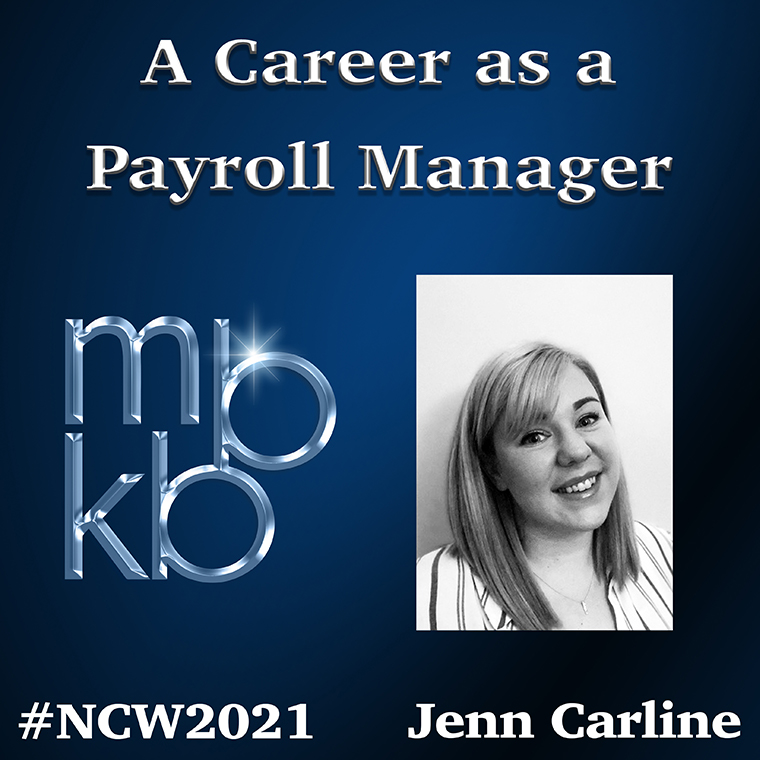25th February 2021
A Career as a Payroll Manager by Jenn Carline.

What career did you want to work in when you left school?
I was very undecided when I left school and flitted between wanting to be a vet, a teacher or work in media. I eventually settled on media studies, but I only lasted a few months in college because I just wasn’t enjoying the experience and really wanted to work.
What was your first experience of payroll?
2 years after leaving college and several jobs and courses and a redundancy, I started work for an accountancy firm as an office admin. Their payroll bureau department was made up of two staff members, one of them left and I was asked if I wanted a go, 11 years later we’re here!
What made you realise payroll manager was the career for you?
I had enjoyed working in payroll but left my first role to go and work for a large organisation to gain more experience. It was then that I realised I could turn payroll into a career. I enrolled into formal training and it was the best decision I ever made. I really enjoyed the nitty gritty of payroll, but I was also really interested in learning how to develop a team and processes to ensure a smooth-running operation. Helping a team to develop either personally or as a whole was something, I was really passionate about.
Name 3 great things about working as a payroll manager
- No two days are ever the same! The one thing you can say about payroll is that it is never boring.
- Payroll is complex, we don’t “just press a button”. You will get the opportunity to develop your team, when you see something click with someone there is a great level of satisfaction.
- People go to work to pay their bills but sometimes things go wrong. It is a very emotive subject that could have quite drastic consequences for an employee. Having the expertise to be able to solve that for an individual is extremely rewarding
Reality check
Being a payroll manager is extremely rewarding but the reality is there are aspects of the job that require a lot of hard work. The responsibility to ensure that employees are paid is ultimately your responsibility, and if that doesn’t happen you will need to be able to provide the rationale as to why. Payroll is a fast past and sometimes a high pressured, stressful environment, so you need to be sure that you can handle that. Unexpected changes happen and sometimes at short notice, in order to remain compliant these changes have to be actioned. This can often lead to late nights and weekends, although hopefully if you have good processes and procedures these shouldn’t be the norm.
What 3 top tips would you give to someone who wanted a career as a payroll manager
- You can never know too much. Keeping up to date is the key to a good payroller and as a manager you should also ensure you are up to date. Technical knowledge is not the only area that you need to consider though. You will need leadership and soft skills to help you to succeed.
- Get involved. What opportunities are available in your organisation to shadow other colleagues or departments, or even get involved in projects that are running? Always remember that payroll is part of a wider team including HR, pensions and finance. Together they work to ensure that employees are paid accurately and on time. As a payroll manager you will be responsible for managing those relationships. You need to really understand how a business works to ensure an efficient service.
- Find the right fit. You need to find a business to work for that is the right fit for you and one that can offer you the opportunities to develop. A good mentor within the workplace can really help you succeed, by providing you with the necessary support and guidance.
How can someone get into payroll management?
Experience is essential you need to be able to do the job of a payroll administrator to understand the challenges they face and be able to manage them. However, gaining a qualification will be invaluable, it backs up your experience and shows that you have proven you know how to perform your job. Try to gain practical management experience, let your employer know your ambitions and see how they can help you. Create a personal development plan, be very honest about areas that you need to improve in and create a plan to address these. Look for opportunities to develop and don’t be afraid to step out of your comfort zone and above all else believe that you can do it!




